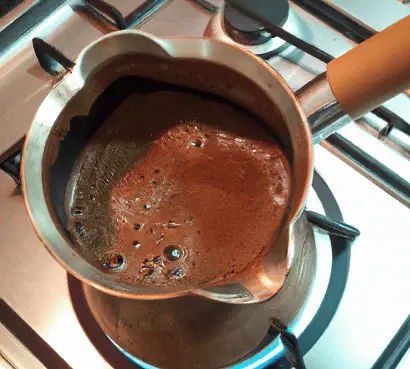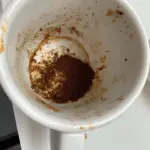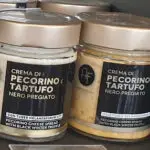There are many different ways to make a great cup of coffee in the comfort of your kitchen. There’s pour over, cold brew, automatic drip and espresso, among many others. But, there’s another method and that’s the Greek version of brewing a cup of Joe.

It’s not very difficult, but making Greek coffee is a little different than other methods. You will need a small saucepan or “briki.” This is a type of brewing contraption specific to this kind of coffee, often associated with the Turkish method.
To make Greek coffee put the finely ground beans in a briki or small pan and add water and sugar. Bring the coffee to a boil over medium heat until foam is visible and then let it sit for 5 minutes before enjoying it.
Greek Coffee – What It Is
Greek Coffee is an old-world way of brewing java. It’s very strong, concentrated and dark black due to how grounds directly steep in water via a small pot, or briki. Once done, it goes into a demitasse cup with the cooked grounds. There are no filters or any other process to remove them; the grounds stay in the cup intentionally.
What makes Greek coffee so unique is the type of grind produced to make it. This is extremely fine, so much so that it appears more like a coffee powder rather than grounds. Therefore, it’s even more minute than what you see used for espresso.
The Briki
A briki is a long-handled traditional coffee pot used on the stove. This is an imperative component to making Greek coffee and there is a variety of sizes. There are single servings but you can get them for as many as six or eight.
They come in several sturdy materials such as ceramic, glass, copper, chromium, nickel, brass and stainless steel. Ones that are more luxurious will comprise things like gold or silver.
Types of Greek Coffee
In all, there are four types of Greek coffee. What determines the difference is the ratio of sweetness.
- Vary Glykos (pronounced vah-ree glee-k-ose): This is super sweet that often incorporates more sugar than coffee grounds used.
- Glykos (pronounced glee-k-ose): A sweet coffee but not a shot of a sugar rush.
- Metrios (pronounced meh-tree-ose): Has just enough sugar to mask the coffee’s distinct bitterness.
- Sketos (pronounced skeh-t-ose): Plain, black coffee without any sugar whatsoever.
How to Make Greek Coffee
Greek coffee is incredibly strong and robust. It’s a concentrated amount of finely ground beans with a small amount of water. The items and instructions below are a place to start. You can increase or decrease whatever amounts to suit your taste and preferences.
Items You’ll Need
- Coffee Grinder
- Briki or Small Saucepan
- Demitasse Cup or Other Small Coffee Cup
- Measuring Cups ; Spoons
- Small Mixing Spoon
Ingredients
- 2 tsp Fine Ground Coffee
- ¼ Cup Filtered or Spring Water
- Sugar (to taste)
Instructions
- With the coffee grinder, place your beans inside and grind them until they are a silt-like powder. The resulting grind should almost stick together in clumps that you can form and shape with your fingers.
- In the small saucepan or briki, put in the grounds, sugar (if using) and, finally, the water. You can measure the water with the briki if there are measurement marks on it; otherwise use a measuring cup for a small saucepan.
- Put the briki or small saucepan on medium low heat and begin to stir the sugar and grounds with the small mixing spoon. Stop stirring once everything blends well and the water begins to heat up.
- Keep an eye on the coffee as it begins to boil because you’ll notice some foam beginning to rise. Once this reaches the top of the pan, remove it from the heat.
- Slowly pour the coffee into your cup and allow it to rest for about five minutes. This will give the grounds time to settle to the bottom of the cup.
- Finally, sip slowly and enjoy!
When to Add the Water
To create the most authentic Greek experience at home, you want to add the grounds and sugar to your briki before topping it off with water. This helps with the mixing process, ensuring the sugar dissolves with some of the grounds.
If you add sugar and grounds after measuring water, these elements will float at the top. This may make mixing a little more difficult. However, it’s not all that serious of an issue in the event you do it this way.
How Long to Boil Greek Coffee?
It doesn’t take very long to boil Greek coffee. This will vary depending on how much you’re going to make. The recipe above is for a single cup, so this wouldn’t be more than 5 minutes. But, if you’re going to make four cups, then it might be five to 10 minutes to boil the coffee.
Does Greek Coffee Have Milk?
Greek coffee doesn’t often have milk in it, although it can include some sort of dairy, like creamer. This is very rare and not a common preference. But, if you want to add a little, pour some in once your cup is done brewing but before you allow the coffee to settle at the bottom of the cup.
How to Make Greek Coffee Foam?
The foam in a Greek coffee, called the “kaïmaki,” is easy to produce. This happens after you stir the sugar and coffee as the water begins to heat. Once it reaches the boiling point, it will begin to foam. This is where you have to keep an eye on the saucepan or briki so it doesn’t foam over.
The moment the water heats up, it begins to froth up to the surface of whatever contraption you’re using to boil it. This happens quickly and if it boils over, you’ll be cleaning up coffee more than drinking it.
Briki Size
However, the size of the briki will play into the foaming factor. If you’re making a single cup in a briki intended for six people, the foam will not occur in the same way as one meant for a single serving. But, it’s important to note that the foaming action while brewing indicates when the coffee is ready.
For instance, too little foam means you used too much water and/or the coffee isn’t yet complete. Too much foam indicates overdone coffee grounds and it won’t taste very good.
How Long Does Greek Coffee Last?
There are several components to understand how long Greek coffee can last. But it depends on if you’re referring to the amount of time it takes to drink it or how long you can save it if you have leftovers.
Drinking Time
One of the most crowning characteristics of Greek coffee is the long amount of time to enjoy it. In Greece, a typical coffee break can last anywhere from one to two hours. The kaïmaki allows the cup to stay warm for a good long while.
This is because of the time you must let the cup sit before consuming it. If you swallow any of the grounds still floating around in the cup, it provides for a bad experience. It tastes gritty and gross, which is further disconcerting by how it trails and sticks in the throat.
It’s why you must have patience with this style of coffee so you can savor the flavors of the brew. Rushing any part of it will not taste good and forgoes the point of drinking it this way: to enjoy the company of those you are with, and thus relishing in life.
Saving Leftovers
Then there’s the matter of saving leftovers. Like any coffee, Greek coffee will keep for up to a week. Once the coffee cools down, you can put it in a storage container with an airtight lid. Then, place it in the fridge. When you want more, simply pull out your small saucepan or briki, put the coffee in it and heat it up.
Note, however, you’ll only be able to do this once. If you end up with additional leftovers after the second heating, you will have to throw it away. It just won’t taste right a third time around, providing for an old/musty flavor with a burnt or stale texture.
Are Greek Coffee and Turkish Coffee the Same?
Essentially, yes, Greek coffee is the same as Turkish coffee. Everything each culture uses is similar in terms of equipment, brewing method and serving. HOWEVER, there is an important cultural disparity to note here. Both Greeks and Turks stubbornly claim to be the progenitors of this kind of brewing style.
With Greece and Turkey having a long and tumultuous history of hardship and rivalry, you do not want to commit a cultural faux pas. So, when you’re at a Greek restaurant, do not order Turkish coffee and when at a Turkish restaurant, do not order Greek coffee. Doing so has the potential to cause contention and contempt.
- The Top Restaurants Specializing in Truffle Dishes - August 10, 2023
- Truffle Panna Cotta: A Decadent Dessert Recipe for Truffle Lovers - August 7, 2023
- Truffle Scrambled Eggs: A Luxurious Breakfast Delight - August 7, 2023








